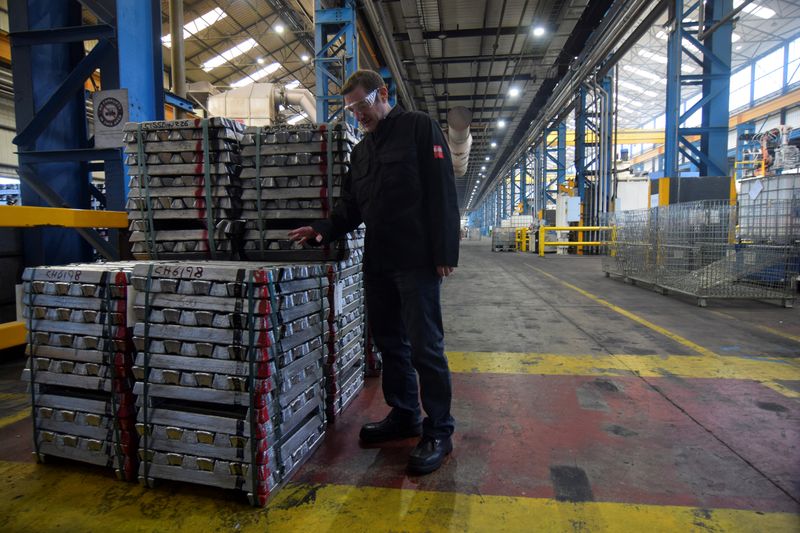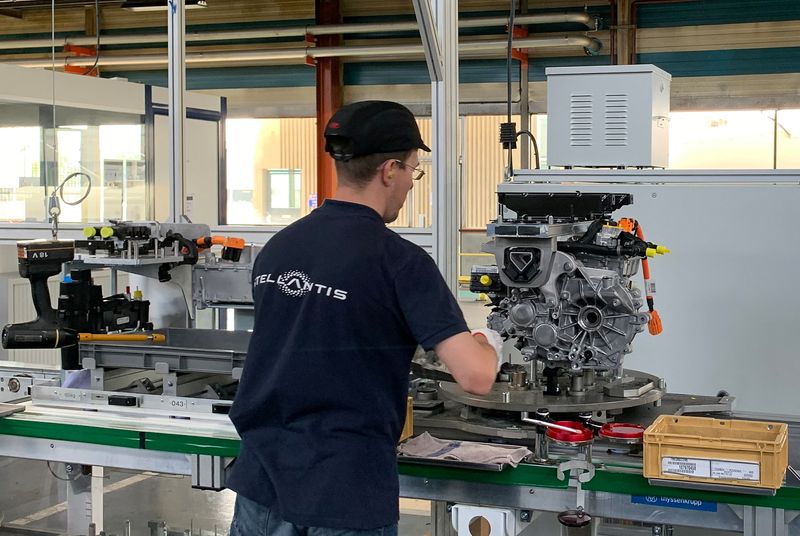By Nick Carey and Christina Amann
KIDDERMINSTER, England (Reuters) - Auto engine parts makers eyeing the promising electric-vehicle market are dealing with a severe case of delayed gratification.
Until EVs truly take off, engine parts makers face a perilous few years where they must invest heavily in new machinery, while struggling with falling sales of fossil-fuel cars.
Evtec Aluminium, a small supplier with two plants in England, is a case in point. It barely survived.
Within the last decade in the European Union - when Britain was still a member - diesel was the green fuel of the future. Carmakers, including Evtec's main customer Tata Motors-owned Jaguar Land Rover (JLR), invested tens of billions of dollars in new diesel models and production capacity.
Suppliers followed suit. Evtec, then known as Liberty Aluminium, invested tens of millions of pounds in new machines, some of which sit idle but are still being paid off.
Then the EU, spurred on in part by Volkswagen (ETR:VOWG_p)'s "Dieselgate" emissions cheating scandal, swiftly abandoned diesel in favour of EVs and now plans to effectively ban combustion-engine car sales by 2035.
"We went in thinking diesel is the future," said Evtec's business director, Brett Parker, on a tour of the company's half-empty foundry in Kidderminster in England's Midlands, the historical heart of Britain's car industry. "We backed the wrong horse, unfortunately."
Evtec was saved last year when a group led by investor David Roberts bought it. Roberts says Evtec's foundry in Kidderminster is Britain's most modern - vast machines here pump molten aluminium heated to around 660 degrees Celsius (1,220°F) into castings to make complex shapes - and stands to benefit as UK carmakers look to build EVs that need aluminium parts.
"For me it was a no-brainer to invest in that business," Roberts said.
As recently as 2015, diesel made up nearly 52% of EU car sales. After Dieselgate and the shift in favor of EVs, diesel fell to 19.6% of EU sales in 2021 and has fallen further this year. In Britain, diesel car sales halved to just 8.2% in 2021.
Petrol car sales in the EU declined to around 40% in 2021 from over 45% in 2015 and will fall further as Europe goes electric.
Major engine parts suppliers like Vitesco Technologies Group AG and Schaeffler are already investing in transitioning to electric, but smaller players like Evtec - for which tracking data is not widely available - must adapt or die.
"Engine parts makers are ground zero for the most amount of pain in this transition because they have the least amount of portability into EV world," said Mark Wakefield, global co-leader of consultancy AlixPartners' automotive and industrial practice.
Some major carmakers have warned of huge job losses, as EV motors have only a third of the parts of a combustion engine and require less labour.
Fewer parts also mean fewer suppliers.
Engine parts suppliers must either transform into an EV-focused business, or diversify into other industries making parts for anything from heavy equipment to hair dryers.
Or go out of business.
"People have to realize this transition comes at a cost," Evtec investor Roberts said. "We all have our own valley of death to get to EVs, but for some suppliers it will be so much harder."
'CAN'T GROW WITHOUT MONEY'
Declining combustion-engine car sales have already cost jobs.
World No. 4 carmaker Stellantis NV, for instance, is shifting its plant in Tremery, France - long the world's largest diesel engine plant - over to EV motors.
Tremery employs 2,400 people now, down from 3,000 in 2019. Many others will not be replaced when they retire.
German supplier Bosch is transforming its plant in Rodez in southern France away from diesel injectors to new products including hydrogen fuel cells, cutting 750 of 1,250 jobs.
Auto industry consultant Bernd Bohr said larger, deep-pocketed suppliers will likely be the "last man standing" for delivering a particular part.
"A lot of companies are fighting for a piece of a smaller and smaller cake and the question is, who's getting that volume?" he said.
Powertrain supplier Vitesco is focused on combustion engines, but by 2030 the company expects EVs will account for 70% of sales.
In January, the German supplier will split its business into two main divisions, one focused on EV components and the other on higher-value technology that can also be used in combustion engines to bring in cash as that business winds down.
Some parts of the business no longer considered to be core will be shut down or sold off.
"We have to generate the necessary funds so we can invest in the future," Vitesco CEO Andreas Wolf said. "I can't grow without money."
Parts supplier Schaeffler expects its future EV business will be smaller than today's combustion-engine sales, so the German company is focused on diversifying its customer base.
For instance, the ball bearings Schaeffler sells to carmakers could be sold to other industries.
'OTHERS WILL DROP OUT'
Smaller suppliers are already struggling with soaring raw material and energy costs, plus the need to invest in greener products to meet carmakers' climate goals.
Funding new equipment for EV parts could be tough.
Evtec's investor Roberts said the company has around 330 million pounds' worth ($363.8 million) of business lined up for EV parts for JLR over a seven-year contract, plus around another 250 million pounds with other carmakers.
But because of long auto industry lead times, the models in those contracts will not start production for two to three years.
Evtec must spend up to 70 million pounds for new tools and machines for those contracts, of which Roberts will pay half, long before any revenue comes in.
Evtec also has support from JLR, which considers it a strategic supplier.
"Our suppliers play a pivotal role in our transformation," a JLR spokesperson said. "We are working closely with them during the automotive industry's transition ... to electrification."
AlixPartners estimates carmakers have committed $526 billion to go electric and if they do not proactively address supplier problems they could end up spending another $70 billion to fix them.
Suppliers making key components could get rescued, but carmakers cannot afford too many bailouts, Wakefield said.
Evtec's Parker said with an investor backing its transition, in the short term the company is looking to "plug the gaps" in revenue.
Earlier this year, when an Israeli supplier folded, Evtec took over some of its business. As suppliers struggle after two years of pandemic, supply shocks and inflation, Parker expects more such opportunities.

"If you can hang on long enough, others will potentially drop out," Parker said. "Then you've got more chance of picking up business."
(This story has been corrected to fix paragraph 27 and 28 to remove reference to third division)
